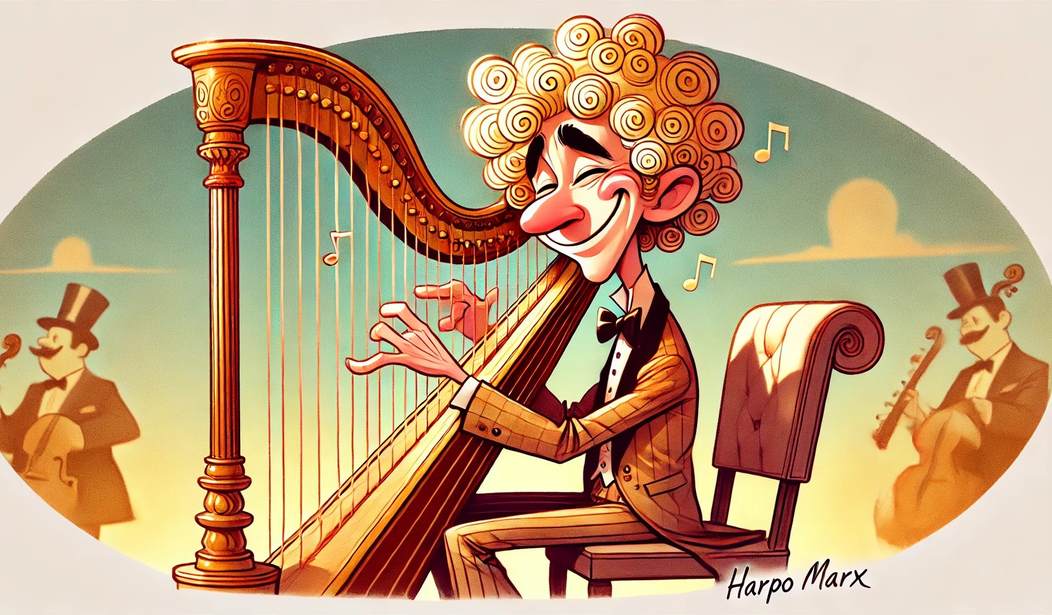Harpo Marx never spoke on screen, yet generations of Americans laughed at, cried with, and enthusiastically applauded him for his comedic genius and musical brilliance. But even amidst the fame and glory of a lengthy career on stage and screen, the Jewish Marx had to contend always with the dark specter of anti-Semitism, leading him to fight for equal rights for all persecuted individuals and for the re-creation of the state of Israel.
Ironically, while one Adolf is infamous for massacring millions of Jews in the Holocaust, the other Adolph — Harpo — would spend his whole life battling anti-Semitism. Born to German Jewish immigrants in New York, Harpo purportedly left school during the second grade and never returned because of physically harmful and anti-Semitic bullying. Before he became the philanthropist and devoted husband and father whom friends and family remembered as unfailingly soft-spoken and loving toward all, Harpo was a bit of a juvenile delinquent. Poor and out of school, Harpo and his brothers picked up singing and playing jobs whenever they could, and Harpo recalled one time when his musical playing in a brothel was repeatedly interrupted as he fainted. When a doctor came in and diagnosed him with measles, the head of the brothel, who had no sexual inhibitions but apparently a few prejudices, said she didn’t want “sick Jews” on her premises.
Read Also: The Birthday of Mickey Mouse, American Icon
Harpo’s beloved wife Susan Fleming Marx said the anti-Semitism Harpo saw in Russia and Europe in the 1930s deeply troubled him, and she and their eldest son Bill Marx recalled Harpo’s first visit to Israel in 1961, per Jewish United Fund (JUF):
For Our VIPs: Amsterdam Mayor Defends Muslims After Anti-Jewish ‘Pogrom’[Bill’s] parents and author James Michener traveled to Israel in 1961 on behalf of the State Department. It was Harpo's first visit to the country. "He was walking down the street with Mom in Tel Aviv," Bill said. "And he says to her, 'You know, this is the first time in my life that I have felt it's okay to be a Jew. I feel safe here.'"
Even at that time the Muslim Arabs had already invaded and were occupying a significant amount of Israeli land, including Jerusalem, where the Jordanians razed the historic Jewish Quarter to the ground. For Harpo and so many other Jews who had experienced anti-Jewish hatred and watched the horror of the Holocaust unfold, Israel was the fulfillment of their hopes and dreams, the return of their ancient ancestral land promised to them by God. Yet Muslims in the East and bigots in the West continued and still continue to persecute and even massacre Jews. We see that with the Oct. 7 atrocities, the daily missile attacks on Israeli civilians from Islamic terrorists, the Amsterdam “pogroms,” and the global wave of anti-Semitic hatred. We should determine to fight irrational and dangerous prejudice, as Harpo did in his time:
So today, take the time to watch and listen to Harpo Marx. But as you laugh at his wild antics and marvel at his musical versatility, remember also that he was the quintessential American success story: a poor and uneducated boy who overcame prejudice and persecution to entertain and inspire millions of people, help his people reclaim their homeland, and make the world a freer and better place.[JUF:] One of the most powerful passages in [Mrs. Harpo Marx’s] book relates a trip to New York in the mid-1950s. Harpo was to appear on The Martha Raye Show. During the visit, Fleming Marx writes, Harpo overheard his wife's own mother refer to him as a "kike." Bill Marx remembers the incident vividly. He was attending Julliard at the time. "He was crushed," he recalls. "He was visibly shaken. I noticed it and asked mom what was the matter. Dad handled it internally. He never complained about it. He was very gracious to my grandmother. I never saw him angry. I saw him more disappointed in certain people and their behavior."
Bill Marx said that his father never spoke with him directly about prejudice and bigotry, but Harpo's treatment of all people as equals spoke volumes. According to the book, Harpo was penalized by southern theater owners after insisting that Black people not be restricted to the upper balcony. "I learned by his example," Bill Marx said. "I watched him around all kinds of people when we were on the road. Dad got Hillcrest Country Club to open up membership to non-Jews. Danny Thomas got in because of my dad."










Join the conversation as a VIP Member